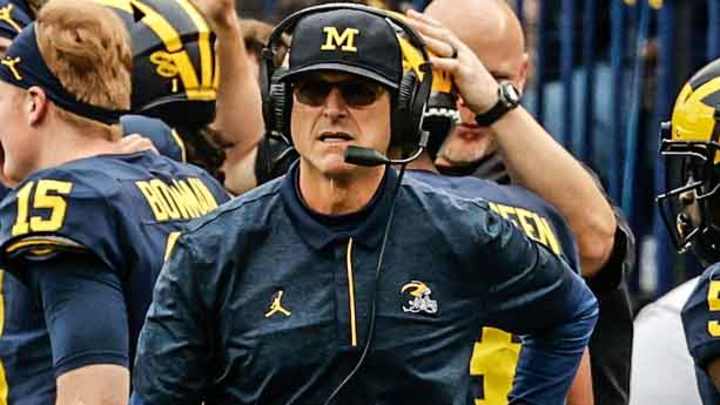Michigan Receives Alarming Wake Up Call One Week Before Madison

The No. 19 Michigan Wolverines looked dominant throughout the first three weeks of the 2021 college football season, punishing opponents with a relentless rushing attack that ranked No. 1 in the nation heading into week four.
Like Michigan, Rutgers also entered Saturday's matchup in Ann Arbor sitting at 3-0 on the season. Even so, most people anticipated the Wolverines would open conference play at home with an emphatic win over the Scarlet Knights in the Big House. As it turns out, most people were wrong.
The relentless attack of Corum and Haskins that had carried the Wolverines to a 3-0 start was essentially nonexistent. The nations No. 1 rushing attack that averaged 350.3 yards per game over the first three weeks was held to just 112 yards on Saturday, with Corum being held to just 68 yards after averaging over 135 on the year.
With the rushing game struggling to move the ball consistently, the deficiencies in Michigan's passing attack quickly became apparent.
After trailing by a score of 20-3 at the half, the Scarlet Knights clamped down on the Michigan rushing attack in the second half in an effort to force the Wolverines to move the ball through the air. Rather than turn to McNamara, Harbaugh insisted on pounding the ball with Corum and Haskins. As a result, the Michigan offense began to sputter and eventually came to a screeching halt by the fourth quarter.
In the midst of a one-score game and with the rushing attack clearly struggling, Michigan quarterback Cade McNamara went just 1-for-5 for 7 yards and zero touchdowns in the second half. As if that isn't hard enough to comprehend, here are McNamara's stats from the fourth quarter of Saturday's game against Rutgers: 0-for-3 for zero yards.
Think about that. You're No. 19 Michigan, you're at The Big House and you're playing Rutgers to open conference play. With your rushing attack clearly struggling and the score getting tight, your quarterback attempts to throw the ball just three times in the fourth quarter and completes none of them.
Look, I get it. I'm not a college football coach. Hell, I doubt I could even coach little league football. In fact, I've literally never coached a single thing in my entire life. I have, however, watched a decent amount of football - at least enough to feel like I know some of the basics. One of the basics I've learned is that, if the rushing game isn't working like it wasn't on Saturday, it seems like a good idea to turn to your passing game.
For whatever reason, Michigan didn't turn to McNamara and the passing game against Rutgers, which leads to some legitimate questions that will undoubtedly be asked throughout the week.
As Michigan ran wild over helpless defensive units throughout the first three weeks of the 2021 season, some began to express concern over the lack of a passing attack from the Wolverines. The overarching concern seemed to be that, although Michigan was dominating opponents on the ground by rushing the ball nearly 50 times each game, that likely wouldn't translate into a winning formula in Big Ten play. Put simply, Michigan needed more from McNamara and its passing attack.
If Saturday's game against Rutgers is any indication of what lies ahead for the Michigan Wolverines in Madison and beyond, it looks like those concerns were valid.
In closing, I'll leave you with some noteworthy stats from Michigan's 2nd half performance against Rutgers on Saturday:
- Rutgers held Michigan to 0 points in the second half, the first time all season Michigan had been held scoreless in a half.
- Rutgers outgained Michigan by nearly 200 total yards (231/42).
- Rutgers averaged 5.8 yards per carry, while Michigan averaged 2.2 yards per carry.
- Rutgers had 152 yards rushing in the second half, while Michigan had just 35.
- Rutgers went 9-for-15 for 79 yards and a touchdown through the air in the second half. Michigan went 1-for-5 for 7 yards and no touchdowns in the second half.
- The Wolverines averaged just 2 yards per play, while Rutgers averaged 5.6 yards per play.
- Rutgers had 14 first downs in the second half, Michigan had just two.
- The Michigan defense allowed Rutgers to convert on 50% of its third down attempts (4-8), while Michigan failed to convert on a single third down attempt in the second half (0-5).
